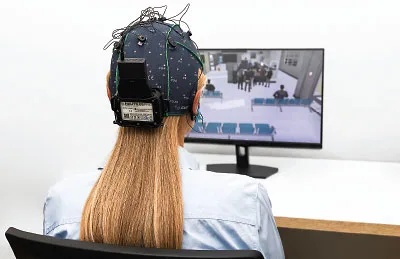What is Complex PTSD?
Complex PTSD also known as( C-PTSD) is a mental health condition that can happen when someone goes through long-term traumas. While C-PTSD is typically linked to childhood trauma, adults exposed to prolonged traumatic experiences can also develop the condition.
What Causes Complex PTSD?
Different lasting traumatic experiences can result in Complex PTSD (CPTSD).
Such as:
- Long-term child physical or sexual abuse
- Long-term domestic violence
- War
- Experiencing human or sex trafficking as a survivor.
- Experiencing torture, kidnapping, or slavery
- Escaping or being rescued from a situation that was impossible to rescue.
What Are Complex PTSD Symptoms?
Flashbacks
Individuals dealing with Complex PTSD may experience flashbacks.
Relationship Difficulties
Individuals with C-PTSD often find it hard to build and sustain healthy relationships. They may be vulnerable to exploitation, and manipulation, and have a fear of being abandoned.
Negative Self-Perception
People with C-PTSD often see themselves negatively, feeling shame, guilt, and mistrust towards others. They may feel fundamentally different from others.
Struggling with Emotions
People who fight with C-PTSD usually struggle with controlling their emotions, often experiencing intense and unstable feelings. They may find it hard to manage anger and regulate their emotions effectively.
Physical Health Issues
Individuals with C-PTSD may experience physical symptoms like chronic pain, fatigue, and gastrointestinal issues, which come from psychological distress.

Distorted Perpetrator Perception
Individuals may become preoccupied with their relationship with the perpetrator, become obsessed with revenge, or attribute total power to the perpetrator.
What Are the Complex PTSD Treatment Options?
Cognitive Behavioral Therapy (CBT)
For Complex PTSD, cognitive therapy usually entails recognizing and disputing unpleasant thoughts and beliefs about the traumatic events. This could entail dealing with the humiliation, guilt, self-blame, or worthlessness that people with C-PTSD frequently experience. Cognitive therapy seeks to reduce discomfort and enhance general functioning by swapping out these skewed ideas for more realistic and balanced viewpoints. Furthermore, cognitive therapy can assist people in creating coping mechanisms to deal with stressors and minimize the anxiety and depressive symptoms linked to complex PTSD.
Exposure Therapy
When someone has Complex PTSD, exposure therapy can help them face and desensitize to these experiences by progressively exposing them to painful memories or triggers in a safe setting. As a result, symptoms are minimized and coping mechanisms become more adept with time. This also minimizes fear avoidance behaviors and mental distress.
Learning Stress Management Techniques
Learning stress management techniques can be beneficial in treating Complex PTSD by providing practical tools to regulate emotions and cope with anxiety and hyper-arousal symptoms. Techniques like deep breathing and mindfulness promote relaxation, empowering individuals to manage stressors and traumatic triggers more effectively, ultimately reducing symptom severity.
Eye Movement Desensitization and Reprocessing (EMDR)
EMDR therapy helps individuals process traumatic memories by using bilateral stimulation to mimic rapid eye movements during REM sleep. This aids in reducing emotional distress associated with the memories. Throughout therapy, individuals focus on the traumatic memory while employing coping strategies to manage symptoms and reactions to triggers.
Transcranial Magnetic Stimulation (TMS)
TMS is a non-invasive procedure, employing magnetic fields to stimulate nerve cells in the brain. It’s explored as a treatment for PTSD to alleviate associated anxiety and depression symptoms. Using a device generating magnetic fields, TMS targets brain areas linked to mood and anxiety regulation, inducing electrical currents that alter nerve cell activity.

Neurofeedback
Neurofeedback, also called EEG biofeedback, is a therapy where individuals learn to control their brain activity in real-time. It’s being studied as a treatment for PTSD to help with anxiety and depression symptoms. During sessions, sensors on the scalp measure brain activity (EEG), shown on a screen for individuals to see and learn from. By training specific brainwave patterns linked to relaxation and emotion regulation, neurofeedback aims to reduce PTSD symptoms by teaching effective brain control.
Ketamine Therapy
Ketamine can also help with depression and anxiety by attaching to a specific part of the brain called the N-methyl-D-aspartate (NMDA) receptor. This changes how the brain handles traumatic memories, potentially easing the emotional distress connected to them.
Complex PTSD Therapist in and Near Los Angeles and Santa Monica
Our expert psychiatrists at Bespoke Treatment offer tailored, complex PTSD treatments based on your mental health condition and your unique needs in Los Angeles and Santa Monica. We understand how frustrating it is to fight C-PTSD alone, so let us help you with our knowledge. Our professional psychiatrists will guide you through a PTSD-free future.
(833) 646-0763
Start Your Journey to Healing PTSD Today
Visit Bespoke Treatment mental healthcare clinics in Los Angeles and Santa Monica and explore various treatment options for PTSD and other mental health conditions.
Get Started












